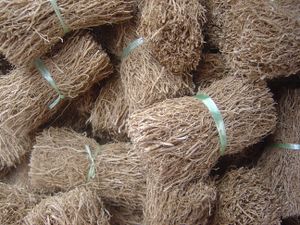Note: This is a project under development. The articles on this wiki are just being initiated and broadly incomplete. You can Help creating new pages.
Difference between revisions of "Chrysopogon zizanioides - Vetiver"
Chaithrika (talk | contribs) |
Chaithrika (talk | contribs) (+Common names) |
||
| Line 12: | Line 12: | ||
The health benefits of Vetiver Essential Oil can be attributed to its properties like anti inflammatory, anti septic, aphrodisiac, cicatrisant, nervine, sedative, tonic and vulnerary. This Essential Oil is very popular in aromatherapy and has many medicinal properties. | The health benefits of Vetiver Essential Oil can be attributed to its properties like anti inflammatory, anti septic, aphrodisiac, cicatrisant, nervine, sedative, tonic and vulnerary. This Essential Oil is very popular in aromatherapy and has many medicinal properties. | ||
| + | ==Common name== | ||
| + | |||
| + | * '''English''' - Khas Khas grass | ||
| + | * '''Kannada''' - ಲಾವಂಚ | ||
| + | * '''HIndi'''खास | ||
== References == | == References == | ||
Revision as of 15:46, 9 March 2017
Chrysopogon zizanioides [1], commonly known as vetiver (derived from the Tamil: வெட்டிவேர் veṭṭivēr) is a perennial bunchgrass of the Poaceae family, native to India. In western and northern India, it is popularly known as khus.
Vetiver is most closely related to Sorghum but shares many morphological characteristics with other fragrant grasses, such as lemongrass (Cymbopogon citratus), citronella (Cymbopogon nardus, C. winterianus), and palmarosa (Cymbopogon martinii).
Medicinal uses
The health benefits of Vetiver Essential Oil can be attributed to its properties like anti inflammatory, anti septic, aphrodisiac, cicatrisant, nervine, sedative, tonic and vulnerary. This Essential Oil is very popular in aromatherapy and has many medicinal properties.
Common name
- English - Khas Khas grass
- Kannada - ಲಾವಂಚ
- HIndiखास
